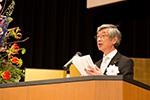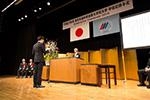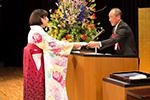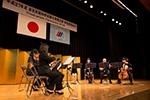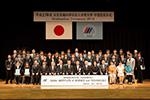2016/03/29
On Thursday, March 24, 2016, a graduation ceremony was held in the Millennium Hall and 367 students received diplomas.
At the ceremony, President Ogasawara handed over diplomas to the students and gave them a congratulatory speech, followed by the speech of Mr. Shigekazu Nakamura, the Executive Director of the Foundation for Nara Institute of Science and Technology.
Then Best Student Awards were conferred to 14 winners by the Foundation.
At the party held after the ceremony, graduates enjoyed the party together with President, Executive Directors and their supervising professors in a friendly atmosphere.
*Number of Graduates in March
【Master's Graduates】
Information Science 125 (9 International students)
Biological Sciences 105 (4 International students)
Materials Science 98 (2 International students)
【Doctoral Graduates】
Information Science 12 (8 International students)
Biological Sciences 9
Materials Science 17 (2 International students)
【Graduates who completed the Doctoral program by submitting the dissertation】
Information Science 1
Total 367
【Congratulatory Remarks to Graduating Students】
I would like to offer my heartfelt congratulations to the 328 master's and 39 doctoral students who have been awarded degrees today.
On behalf of NAIST, I would also like to congratulate and thank the families of the graduates for supporting them during their years at NAIST. My gratitude also goes out to all individuals and groups who have supported the international graduates in their studies and lives.
Including the graduates in front of me today, NAIST has conferred 6,911 master's and 1,310 doctoral degrees since its establishment. We look forward to your future accomplishments as important members of our distinguished alumni network.
This year marks the 20th anniversary of the first student receiving a master's degree from the Graduate School of Biological Sciences.I am sure some of you have noticed the mountain cherry tree NAIST received from the first graduating class of the Graduate School of Biological Sciences to commemorate this anniversary. There is a commemorative plaque with the names of the 88 graduates of that class. I hope the ties you have created with students and faculty here at NAIST will continue to be an important part of your life, and that this network will be a valuable source of support and opportunity after graduation.
Among today's graduates are 25 international students from 16 countries, bringing the total number of NAIST graduates from overseas to 415 from 57 countries. It pleases me greatly to see our network of graduates continuing to expand worldwide.
For example, in Indonesia more than 30 NAIST alumni are working diligently at various educational and research institutions. Two alumni have been selected as one of the Top 100 Researchers in Indonesia, and many have initiated new research projects in Indonesian universities. Also, the NAIST Indonesia alumni activities are being held, and with the help of alumni NAIST will open its first overseas liaison office in Bogor, Indonesia this April.
NAIST's role does not end with sending you into society. Rather, NAIST faculty and staff considers our role as building relationships with alumni so that each and all of you will be able to continue your creative lives in an ever-changing community of science and technology. It is truly my hope that our alumni network continues to grow in Japan and throughout the world.
Currently changes are occurring around the world. As is said too often today, the increase in cross-border mobility of information, people and goods is accelerating economic development in the entire world, this highlights the importance of addressing several imminent global issues, such as global resource and energy scarcity and global climate change, in a manner compatible with human activities, thereby ensuring sustainable development of our society.To this end, we must reform the current model of societal development, which simply places focus on the pursuit of material affluence. In this light, we may say that we are in an age where there is no precedent or roadmap to follow.
We now face radical changes in the fields of science and technology. At a meeting to discuss the advancement of science and technology in Japan, the Ministry of Education, Culture, Sports, Science and Technology (MEXT) once mentioned:
"At the forefront of today's research are breakthroughs in measurement, analysis, and computational technology that are rapidly expanding our understanding of natural and social phenomena. Consequently, scientific research itself is rapidly expanding and evolving, against the backdrop of: ongoing increases in amounts of information available and radical progress in computational science bringing about faster information processing speeds; and the development of transportation and telecommunications networks making unprecedented speed in information dissemination and sharing possible. In broad domains such as life and materials sciences, interdisciplinary and multidisciplinary fields are being developed, and the frontiers of knowledge are being expanded rapidly. Moreover, availability and accessibility of various "big data" (such as genome data, earth observation data, and human activity data) have created needs and opportunities for generating new knowledge."
Especially in ICT (Information and Communication Technology), scientific and technological developments are rapid, as was seen in the recent news about artificial intelligence defeating a human opponent in the game of Go.
When the master's course graduates today entered NAIST the keyword was 'Big Data', but now it is the 'Internet of Things' and 'AI'. We can also see the prospects of a 'Super Smart Society' which integrates the 'cyber world' and the 'real world' through networks connecting everything around us to effectively and thoroughly respond to the various needs of society in offering the necessary materials or services to the necessary people at the necessary time in the necessary amount. Through the development of ICT in various societal infrastructures, not only in 'developed countries', it is possible that new societal systems will emerge.
ICT is becoming a driving force for further advancement of science and technology. Data-driven science has become a new paradigm in the field of life sciences, and the principles of informatics are being applied to the field of materials science in materials informatics.
As a graduate of NAIST, I would like you to actively approach creating and applying new science and technology.
So... let me ask you all. What can you do to contribute to such social innovation? In regards to this, I'd like you all to pay special attention to the following part of a MEXT committee report:
"For scientific research to serve as a 'source of national strength' in this era of rapidly expanding knowledge frontiers, it is utmost important for researchers to challenge themselves to cultivate new knowledge based on their own knowledge, creativity and research skills, and it is vital for researchers to keep in mind and clarify the significance of their own research subject (spirit of challenge). To cultivate new knowledge, of course, it is necessary to place a high value on diversity and knowledge of traditional research fields. in the current era, researchers must maintain a broader, comprehensive view to avoid compartmentalized knowledge (well-roundness).They are also faced with demands to produce new academic domains through cooperation and collaboration with researchers from various fields and a broad range of domestic and foreign counterparts (multi-disciplinary).Furthermore, through discussion and verification in the global science community, researchers must strive to obtain global recognition of your excellent work by proposing new research frameworks, thus contributing beyond national borders (global perspective)."
I hope all of you will become advocates for the creation and implementation of innovative science and technology.
During your years at NAIST, you have not only gained academic expertise but also developed the ability to identify problems, explore and implement solutions, evaluate outcomes, and write academic papers on the results through discussions to encounter various viewpoints. I am confident that such experiences at NAIST, along with the network you will establish here, will help you all lead creative lives.
In concluding my message, I would like to congratulate you all again. We look forward to your future success, and we will continue to support your future endeavors.
Naotake Ogasawara President
Nara Institute of Science and Technology ,March 24, 2016


